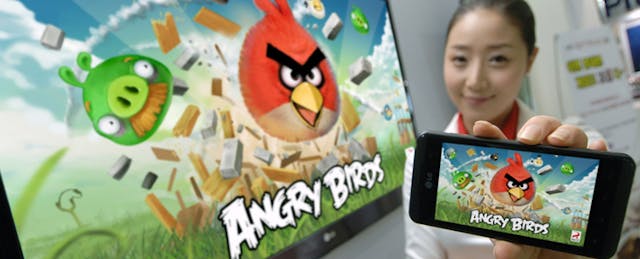What’s the best way to convince education ministers about the learning potential of games? Tell them you’re fusing what Finland knows about learning with the viral addictiveness of Angry Birds.
For the past three years, Rovio, whose games have been downloaded over two billion times, has been quietly working on Angry Birds Playground, an educational program for children ages 3 to 6 years old.
Now, the Espoo, Finland-based company is getting the word out. Leading this effort is Peter Vesterbacka, Rovio’s chief marketing officer who often goes by the code name, “Mighty Eagle” and dons a bright red Angry Birds sweatshirt. In April, he gave EdSurge a peek at Angry Birds Playground and the “Fun Learning” curriculum.
The program is designed to be implemented and taught by teachers in a school environment. The curriculum is based on the Finnish National Curriculum for Kindergarten and covers 21st century skills that span language, math, music, arts and crafts, physical education and social learning. A key element of the curriculum, Vesterbacka says, is that the materials will be offered in two languages: both the local language of the country, as well as English.
The program has been developed by teachers, academics and pedagogues from the University of Helsinki and Cicero Learning Network and tested with “hundreds of kids in Finland and Singapore,” says Vesterbacka.
There’s digital content for smartboards, tablets and phones, including games that feature lovable Angry Birds characters. In addition, there are physical learning materials including activity books, logic games and even musical instruments. Rovio has partnered with the likes of CERN, NASA and National Geographic to create materials such as these activity books.
For a brand synonymous with fun, Rovio is pretty serious about training and certifying teachers to teach the program. The company is partnering with universities around the world--usually those which already have teacher education programs--to conduct intensive training that includes pre-assignments, one full “immersion day,” and two weeks of “immersion period.”
That may seem long. But it may be barely enough time given that the training manual is hundreds of pages long. The program was designed in collaboration with the Department of Teacher Education at the University of Helsinki, one of the most distinguished--and rigorous--programs in the world.
First Nests
In the coming months, Rovio will begin pilots in major Chinese cities: Shanghai, Beijing, Chengdu. Already the company has agreed to build a physical Angry Birds Playground learning space in Shanghai.
The decision to begin the program in China was intentional, says Vesterbacka. “China is pretty open to new ideas and new things. And because of the way China works, you can make big things happen very fast.”
The company is also in discussion with Brazilian education officials. “We’re finding similar things to be true in Brazil,” he adds. “It is an emerging economy, and they are very aware of the importance of education here.”
Also on the company’s radar is the U.S., especially in light of President Obama’s recent push to expand early childhood learning programs. On Monday, Rovio introduced its Fun Learning program at the Finnish embassy in Washington, DC, where Finland’s education minister and head of curriculum development shared their country’s philosophies and approaches to education.
However, it may take awhile for the Fun Learning program to take root here. “It will take us a longer time in the U.S. and Europe, where you have more established systems and ways of doing things,” says Vesterbacka. “There’s more friction.”
Big Bird Advantage
Rovio’s enormous success has given it the luxury of taking its time to build out Angry Birds Playground. (Even in a disappointing year, the company still booked nearly €27 million in net profit in 2013.) “Most startups could have never taken three years to build this,” acknowledges Vesterbacka.
And unlike most US-based companies, Rovio does not have any plans to build assessment or reporting tools that tell teachers or parents about the children’s progress. “We’re very open about the fact that we don’t know everything,” says Vesterbacka.
Taking a page out of the Finnish education philosophy, he argues that not all learning--especially at an early age--can be, or should be, measurable by reports and grades. “What’s more important is building trust among teachers and students to do the right thing.”
Rovio will have to get past some trust issues of its own. People may love Angry Birds, but parents may wonder whether the “educational” program is a gimmick to get kids hooked on the games and the brand.
Vesterbacka says he’s not worried. Even better: he’s in no rush to win over everyone.
“It could take ten years for us to figure out how to really make an impact on education,” says Vesterbacka. “But we have all the time in the world.”


